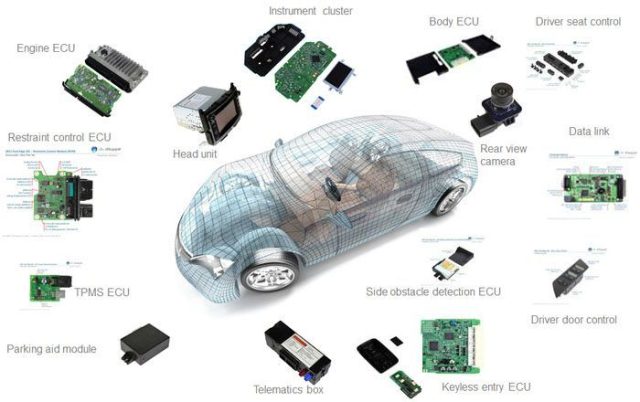China, as the world’s largest automotive market, has become a dominant force in the field of autonomous driving and new energy vehicle technologies. With over 160 OEMs and a rapidly growing electric vehicle (EV) ecosystem, the nation’s transition toward intelligent and electrified mobility is accelerating.
This article explores China’s advancements in autonomous driving, highlights the major players shaping the ecosystem, and examines the increasing demand for high-reliability PCBs and PCBAs that power this new generation of smart vehicles.
1. Key Players in China’s Autonomous Driving Ecosystem
Baidu Apollo — Driving AI and Vehicle-Road Collaboration
Baidu’s ACE Traffic Engine (Autonomous Driving, Connected Roadways, Efficient Mobility) integrates artificial intelligence and smart transportation infrastructure under its “1+2+N” architecture.
-
Deployment: Implemented in over 10 cities including Beijing, Changsha, and Hefei.
-
Innovation: Its autonomous ride-hailing platform “Luobo Kuaipao” has completed more than 600 million passenger trips by 2024.
-
Impact: Demonstrates the scalability and maturity of China’s vehicle-road collaborative systems.
UISEE Technology — Autonomous Logistics in Industrial Parks
UISEE specializes in unmanned logistics within factory environments. Its L4-level autonomous driving platform operates 24/7 in production facilities such as the SAIC-GM-Wuling plant, handling over 6,000 cargo transfers and 10,000 km of autonomous navigation.
This has become a benchmark for efficiency improvement in industrial logistics automation.
TuSimple — Pioneering Autonomous Freight Transportation
TuSimple focuses on long-haul autonomous trucking, an essential sector for China’s logistics modernization. In collaboration with Beiqi Foton, Huawei, and Shoufa Group, TuSimple successfully demonstrated platooning, synchronized braking, and lane-change coordination on highways, reducing logistics costs and emissions while improving safety.

Key Players in China’s Autonomous Driving Technology Ecosystem
- Baidu Apollo:
- Technology Overview: Baidu’s ACE (Autonomous Driving, Connected Roadways, and Efficient Mobility) Traffic Engine embodies years of AI and autonomous driving research. It employs a “1+2+N” system architecture, which includes one digital infrastructure, two intelligent engines (Apollo and vehicle-road collaboration engines), and multiple application ecosystems.
- Deployment: The ACE solution has been successfully implemented in over 10 cities, including Beijing, Changsha, and Baoding. Recently, Baidu secured projects in Chongqing, Yangquan, and Hefei, further solidifying its role in China’s smart transportation sector.
- Competitive Edge: Baidu’s “Robobus” service, known as “Luobo Kuaipao,” has established a strong foothold in autonomous ride-hailing, with over 600 million passenger trips completed by 2024.
- UISEE Technology:
- Specialization: UISEE’s focus is on unmanned logistics within industrial parks and factories. Since 2019, UISEE has operated fully autonomous logistics routes at the SAIC-GM-Wuling plant. The solution involves L4 autonomous vehicles and an intelligent cloud-based operations platform.
- Impact: With over 10,000 km driven and 6,000 successful cargo transfers, the system exemplifies the efficiency gains achievable in factory logistics through autonomous technology.
- TuSimple:
- Focus Area: TuSimple’s core expertise lies in highway autonomous trucking. In December 2019, TuSimple demonstrated a successful convoying system on a 14-kilometer stretch of the Jingli Highway. Collaborating with industry leaders like Beiqi Foton, Huawei, and Shoufa Group, TuSimple’s system achieved synchronized lane changes, platooning, and cooperative braking, setting new standards for large-scale highway applications.
- Market Position: TuSimple’s model addresses the needs of long-haul logistics and aims to reduce transportation costs, fuel usage, and emissions, areas that are vital to China’s carbon neutrality goals.

2. Technological Trends Empowering China’s Smart Mobility
China’s autonomous driving development benefits from the integration of cutting-edge technologies:
-
C-V2X (Cellular Vehicle-to-Everything): Enables seamless data exchange between vehicles, infrastructure, and pedestrians — essential for real-time decision-making.
-
AI-Driven Decision Systems: Machine learning algorithms assist in navigation, path planning, and collision avoidance.
-
Multi-Sensor Fusion: Combines lidar, radar, and camera data for comprehensive situational awareness.
These innovations accelerate the industrialization of autonomous systems, creating vast opportunities for automotive electronics and high-frequency PCB manufacturers.
3. PCBA and High-Frequency PCB in New Energy Vehicles
The rapid electrification and intelligence of automobiles are driving strong demand for PCBA in new energy vehicles (NEV).
Two major factors contribute to this growth:
-
Electronic Control Expansion: Compared with traditional fuel vehicles, EVs rely heavily on electronic control systems, increasing PCB usage and complexity.
-
Core Components: Batteries, motors, and controllers — the “three electric systems” — require high-speed and high-frequency PCBs for efficient energy conversion and precise control.
As a result, high-reliability PCBs, such as high-frequency PCB, high-speed PCB, HDI PCB, and FPC, have become indispensable in EV applications, from battery management systems (BMS) to ADAS and charging modules.
4. KKPCB’s Strength in Automotive and EV PCB Manufacturing
As a zero-defect and reliable PCB & PCBA manufacturer, KKPCB specializes in high-precision and high-reliability circuit boards for automotive applications.
Our capabilities include:
-
✅ Compliance with IATF16949 and ISO13485 standards for automotive industry manufacturing.
-
✅ High-frequency & high-speed PCB production for radar, sensors, and control modules.
-
✅ Comprehensive quality control system, ensuring 100% inspection from material sourcing to final assembly.
-
✅ Flexible volume production, from prototype samples to mass manufacturing.
KKPCB provides one-stop PCB manufacturing and assembly solutions, empowering automotive OEMs and Tier-1 suppliers to accelerate innovation in electric and autonomous vehicles.
5. Conclusion
China’s advancements in autonomous driving, intelligent logistics, and electrification are redefining the global automotive landscape.
Behind every intelligent system is a high-quality PCB and PCBA ensuring safety, stability, and performance.
With strong R&D support, advanced production lines, and strict quality management, KKPCB stands as your trusted partner for automotive electronics PCB, EV PCBA, and high-frequency circuit solutions — driving the future of smart mobility together.


